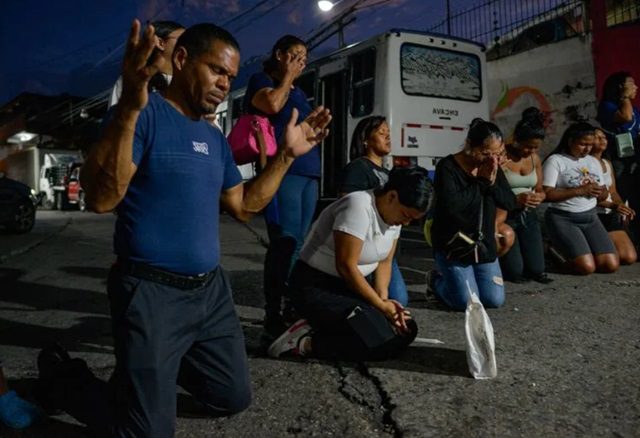BTN News: Venezuela is currently facing a huge wave of violence and fear. Many people call it a virtual state of siege. This surge in violence started right after the recent elections. These elections have been widely criticized as fraudulent. Human rights activists say the situation is very bad, with brutal crackdowns on protesters, random arrests, and many human rights abuses. President Nicolás Maduro’s government has reacted with a harsh and violent campaign against opposition members, activists, and ordinary citizens. This threatens to throw the country into even more chaos.
The harsh response began immediately after the disputed election results were announced. Maduro had warned of a “bath of blood” if the opposition won. He kept his threat. The government’s response was quick and severe. At least 20 young people have died due to brutal crackdowns. Over 1500 people have been arrested, and opposition leaders, election witnesses, and members of electoral boards have been targeted. Reports of torture are also coming out, showing the terrible reality of the situation.
Maduro’s ominous words, “I said we’re going after everyone, and we are going after everyone,” show the government’s intent to crush any dissent. He has accused opposition members of trying to form a new force to undermine his government. He calls them criminals, fascists, and terrorists. In a scary display of power, Maduro showed 76 detainees in a prison yard. They had their heads shaved and were dressed in prison uniforms. They were forced to chant slogans in praise of Hugo Chávez. These people are mostly young protesters from poor neighborhoods. They are not allowed to see their families or have legal representation. Many of them face quick trials via Zoom in police stations.
Human rights groups have reported cases of torture. One example is Juan Hidalgo Rodríguez, a 21-year-old who urgently needs medical help due to the abuse he suffered. The level of repression now is worse than anything seen in Venezuela in the past 35 years. This crackdown affects not only community leaders and civil society activists but also former political prisoners. An example is the recent re-arrest of journalist and activist Roland Carreño, who had already spent three years in the notorious Helicoide prison.
The government’s strategy involves mass arrests. Groups of 40 to 50 people are detained at the same time, often without specific charges or warrants. This is a severe escalation compared to previous waves of repression in 2014, 2017, and 2019. In this tense situation, a paramilitary group attacked the national headquarters of the Comando con Venezuela and the political office of opposition leader María Corina Machado. The attackers, who were armed and masked, overpowered security guards, stole equipment and documents, and vandalized the premises. Machado has since gone into hiding because of threats against her life.
The opposition believes the attackers were looking for electoral records, which have been made public online. Despite delays and suspensions, the National Electoral Council (CNE) released the second electoral bulletin. It claimed Maduro defeated his opponent with over 51% of the vote, a result that the opposition says is false. These official results were quickly validated by the Supreme Tribunal of Justice (TSJ), which is controlled by Maduro, further strengthening the government’s hold on power.
The electoral data released by the government has been criticized for inconsistencies and unlikely statistical patterns. This raises more doubts about their truthfulness. Experts, including mathematician Rodrigo Ipince, have pointed out the suspiciously rounded percentages and other strange details.
In short, Venezuela is going through a serious human rights crisis. The country is seeing unprecedented levels of state violence, repression, and authoritarianism. The world is watching as Maduro’s government tightens its control, leaving the future of the nation in a dangerous state.


